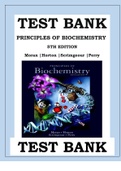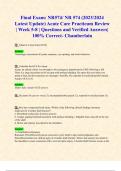Exam (elaborations)
PRINCIPLES OF BIOCHEMISTRY, 5TH EDITION TEST BANK BY MORAN, HORTON, SCRIMGEOUR, PERRY ISBN-978-0321707338 This is a Test Bank (STUDY QUESTIONS WITH ANSWERS) to help you study better for your Tests.
- Course
- Institution
- Book
PRINCIPLES OF BIOCHEMISTRY, 5TH EDITION TEST BANK BY MORAN, HORTON, SCRIMGEOUR, PERRY ISBN-978-8 This is a Test Bank (STUDY QUESTIONS WITH ANSWERS) to help you study better for your Tests. Chapter 1. Introduction to Biochemistry Chapter 2. Water Chapter 3. Amino Acids and the Primary Structures...
[Show more]




